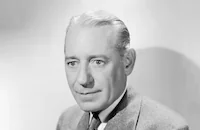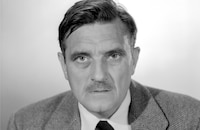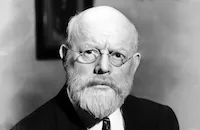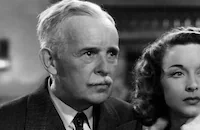The Heavenly Body

Brief Synopsis
Cast & Crew
Alexander Hall
William Powell
Hedy Lamarr
James Craig
Fay Bainter
Henry O'neill
Film Details
Technical Specs

Synopsis
In Bandello, California, just outside Los Angeles, noted astronomer William S. Whitley is about to make scientific history for his discovery of a new comet. Although Bill's young wife Vicky is supportive of his work, she has grown weary of his long, odd hours and yearns for companionship. Consequently, Vicky agrees to visit Mrs. Margaret Sibyll, an astrologer recommended by her nosy next-door neighbor, Nancy Potter, even though she knows that Bill would disapprove. After briefly reading Vicky's astrological chart, Mrs. Sibyll predicts that "something important" is soon going to happen to her. Later, at home, Vicky tells Bill that because of her astrological "aspects," he can no longer kiss her on Tuesdays. Bill explodes at Vicky's involvement with Mrs. Sibyll, but is unable to dissuade her. Two weeks later, Vicky shows up at Bill's mountaintop observatory to inform him that she is leaving him for a "man who really loves" her. Vicky reveals that, as Mrs. Sibyll has predicted that she will meet her "dream" man within two weeks, she wants to make herself available to for him now. Bill manages to make light of the situation until Vicky moves out of their bedroom. Infuriated, Bill takes up residence at the observatory and attempts to concentrate on a lecture he is scheduled to deliver about his comet. Two weeks later, just before midnight, Vicky calls Bill at work and reveals that, as her dream man has yet to appear, she has decided that Mrs. Sibyll is a fake. Relieved, Bill races home, but before he arrives, Vicky meets Lloyd X. Hunter, the handsome neighborhood air raid warden. Although Lloyd, a former foreign correspondent, fits Mrs. Sibyll's description of Vicky's dream lover to a tee, Bill is oblivious to his wife's interest in the warden. Later, however, Vicky tells Bill that Lloyd is "the one." The next day, Lloyd returns to the Whitleys' to pick up a bag he left and is stunned when Bill reveals Vicky's plan to make him her second husband. Lloyd at first agrees to Bill's suggestion that he change his route to avoid Vicky, but soon returns to confess that he intends to pursue her. Later, a frantic, distracted Bill leaps from his co-worker Professor Stowe's car on the way to his comet lecture. Stowe is about to deliver the lecture himself when Bill shows up at the observatory, gleeful because he is convinced that, through a ruse, he has separated Vicky and Lloyd. As he is about to start his lecture, however, Bill looks through a small telescope he uses to check up on Vicky and sees that she has unexpectedly gone to their mountain cabin, the same place to which he sent Lloyd. Bill carries on with his lecture, which he delivers while an image of Whitley's Comet is being projected on a wall, but becomes almost incoherent when, through the telescope, he spies Vicky and Lloyd meeting at the cabin. Afterward, Bill rushes to the cabin and finds Lloyd seranading Vicky with Bill's guitar. Insisting that she came to the cabin to get away from Lloyd, Vicky tells Bill that their meeting is further proof that they are destined to be together. The next day, Bill gets the idea to steal Vicky's weekly horoscope before she reads it and replace it with one that predicts his imminent doom. An anxious Vicky calls Mrs. Sybill to confirm the prediction, unaware that Bill is with the astrologer, threatening to destroy her office if she reveals his subterfuge. Bill then intimidates Mrs. Sybill into maintaining her silence by implying he knows about some illegal activity in which she is involved. As hoped, Bill's dire "prognosis" delays Vicky's abandonment and fills Lloyd with jealousy. Even after the teetotaling Bill becomes drunk with a Russian dog groomer, whom he is passing off as his doctor, Vicky is sure he is going to die. Then, just as Bill starts to write his will, Vicky is summoned by Mrs. Sibyll, who reveals that she had been hording canned goods but has "come clean" with the ration board and now wants to set the record straight regarding Bill. At the Whitleys', Lloyd tells Bill about Mrs. Sibyll's call, and sure that Vicky will be furious with him, Bill leaves home. To Lloyd's dismay, Vicky is instead touched by the lengths to which Bill has gone to win her back and breaks with Lloyd. After three weeks, however, Bill is still missing, and Vicky leaves for Reno to get a divorce. On the way, she stops at the observatory and takes a nostalgic peek through Bill's telescope. To her surprise, she sees Bill walking outside their cabin and dashes off to reunite with him.

Director

Alexander Hall
Cast

William Powell

Hedy Lamarr

James Craig

Fay Bainter

Henry O'neill

Spring Byington
Robert Sully

Morris Ankrum
Franco Corsaro

Connie Gilchrist
Max Willenz
Alex Melish
Earl Schenck
Arthur Space
Helen Freeman
Phyllis Kennedy
Marietta Canty
Nicodemus

Howard Mitchell
Dan B. Sheffield
Gertrude W. Hoffmann

James Baskett
Jack George
Elspeth Dudgeon
Bertram Marburgh
Wheaton Chambers
Evellyn Dockson
Jacqueline Miller
Ralph Sanford
John Sheehan
Buddy Gorman
Cliff Nazarro
William Sabbot
Andre Charlot
John Elliott

Howard Hickman
Henry Sylvester
Gus Glassmire
Crew
Michael Arlen
William Brockway
Howard Culver
Mark Davis
William Ferrari
Cedric Gibbons
Arnold Gillespie
Irving Glassberg
Danny Hall
Joan Hathaway
Arthur Hornblow Jr.
Irene
Bronislau Kaper
Harry Kurnitz
Standish J. Lambert
Bill Lewis
M. J. Mclaughlin
Vincente Minnelli
Warren Newcombe
Mclean Nisbet
Robert Planck
Walter Reisch
Dr. Robert S. Richardson
Arthur Rose
Blanche Sewell
Douglas Shearer
Robert W. Shirley
Herbert Stahlberg
William Steinkamp
Michael Steinore
Jacques Thery
John A. Williams
Edwin B. Willis

Videos
Trailer
Hosted Intro
Film Details
Technical Specs

Articles
The Heavenly Body
The Heavenly Body was particularly timely, with a plot revolving around a popular craze, astrology. Although astrology had been practiced since the days of ancient Egypt, it had enjoyed a particular revival of popular interest since the '30s, when the London Sunday Express carried a natal chart of the newly born Princess Margaret. The American Federation of Astrologers had been founded, as the American Federation of Scientific Astrologers, in 1938 to encourage serious study of the stars as keys to human psychology and behavior. Even timelier was a key plot element, in which a character was discredited by the revelation that she was a ration hoarder, a reference to government rationing of food and other crucial supplies during World War II.
The film actually came about because Lamarr had turned down studio head Louis B. Mayer's first choice for her. As notorious for the films she refused to make -- including Casablanca (1942), Gaslight (1944) and Laura (1944) -- as for the one's she actually made, she had, wisely as it turned out, refused the role of a Chinese wife and mother fighting the Japanese occupation in Dragon Seed (1944). The film went to Katharine Hepburn, while Lamarr moved into her role as Powell's astrology-addled wife in The Heavenly Body.
For Powell, the picture was the first feature he had made in two years. He had been forced to cut back on his film work during the '40s because of health problems, including chronic ulcers and his recovery from rectal cancer. To make matters worse, in 1942 his first two wives, Eileen Wilson and actress Carole Lombard, had both passed away. His marriage to the younger Diana Lewis and the support of his friends helped him get through, but he had had to curtail his filmmaking. Since Crossroads, he had only played a cameo, as himself, in The Youngest Profession (1943). After The Heavenly Body, he would return to familiar territory as Nick Charles in The Thin Man Goes Home (1944).
Working with screenwriter Harry Kurnitz, who had also written Powell's I Love You Again (1940) and Shadow of the Thin Man (1941), he got to play the kind of angry befuddlement and slapstick comedy his fans enjoyed. For The Heavenly Body, he played out a comic battle with a garden hose and a scene in which he grows increasingly drunk while trying to entertain a group of dancing Russians. The latter, which revolved around his character's getting drunk for the first time, was something of an in-joke, considering his identification with the role of the hard-drinking detective Nick Charles.
Even though The Heavenly Body was a substitute for another film, MGM and producer Arthur Hornblow, Jr. were not about to waste Lamarr on an inferior product. She was photographed by Robert Planck, who had been glamorizing everyone from Norma Shearer to Joan Crawford since arriving at MGM in 1940, and costumed by Irene. To help hone her comic talents, the studio borrowed director Alexander Hall from Columbia, where he had gotten strong performances out of Loretta Young in The Doctor Takes a Wife (1940) and Bedtime Story (1941), Robert Montgomery in Here Comes Mr. Jordan (1941) and Rosalind Russell in My Sister Eileen (1942). When shooting dragged on, and Hall had to return to Columbia for another film, Vincente Minnelli took over, adding his particular approach to glamour to the picture.
The Heavenly Body opened to respectful, though hardly enthusiastic reviews. The Variety critic nailed the film's main selling points with "The camera has been particularly good to her [Lamarr] in this one, and her clothes are plenty eye-appealing." That was enough to please audiences, if not Lamarr. Although she wrote kindly of Hornblow's production in her memoirs, she would leave the studio a year later hoping to find better projects than those MGM was offering.
Producer: Arthur Hornblow, Jr.
Director: Alexander Hall
Screenplay: Michael Arlen, Walter Reisch, Harry Kurnitz
Based on a story by Jacques Thery
Cinematography: Robert Planck
Art Direction: Cedric Gibbons, William Ferrari
Music: Bronislau Kaper
Cast: William Powell (William B. Whitley), Hedy Lamarr (Vicky Whitley), James Craig (Lloyd X. Hunter), Fay Bainter (Margaret Sibyll), Henry O'Neill (Prof. Stone), Spring Byington (Nancy Potter), Morris Ankrum (Dr. Green), Connie Gilchrist (Beulah Murphy).
BW-96m. Closed captioning.
by Frank Miller

The Heavenly Body
Quotes
Trivia
Notes
The working title of this film was The Stars Can Wait. Although onscreen credits list Connie Gilchrist's character name as "Beulah," she is called "Delia Murphy" in the film. Except for a cameo appearance in M-G-M's 1943 picture The Youngest Profession (see below entry), The Heavenly Body marked William Powell's first picture since the 1942 film Crossroads . Crossroads was also the first time in which Powell co-starred with Hedy Lamarr, and according to modern sources, the success of that film prompted M-G-M to re-team them in The Heavenly Body.
M-G-M borrowed director Alexander Hall from Columbia for this production. In mid-July 1943, when Hall was forced to return to Columbia to begin work on Once Upon a Time , Vincente Minnelli took over as director for the remainder of the production. Although Robert Planck is credited onscreen as director of photography, William Daniels was listed as cameraman in all Hollywood Reporter production charts. In M-G-M publicity material, located in the file on the film at the AMPAS Library, Phillip Terry was listed in the role of "Whitley's" assistant, but he did not appear in the final film. Lloyd Ford, Bobby Waters and Rex Evans were listed by CBCS as cast members, but their parts were not included in the completed film. Although Arno Frey and Dudley Dickerson were listed in Hollywood Reporter news items as cast members, their appearance in the final film has not been confirmed.
















